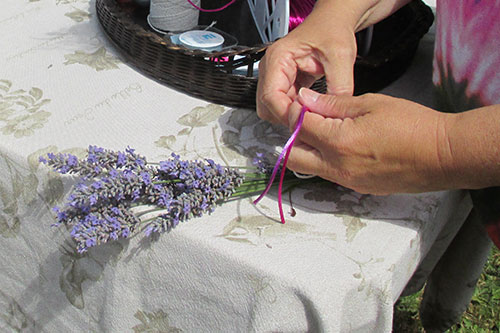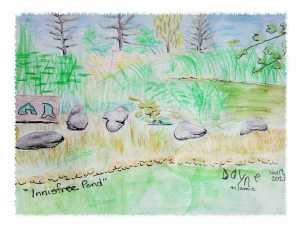Gardens without Borders
Gardens without Borders is a federally registered not-for-profit organization, established in 2008 and based at Innisfree Farm, that provides healing opportunities through plants and gardening.
We offer a range of Horticulture Therapy (HT) activities, providing professional services that use plants and the natural world to help anyone who is looking to improve their personal well-being, including physical, mental, emotional, spiritual, vocational, and creative health.


Gardens without Borders Featured in a Local Magazine
“The garden at Innisfree is designed specifically for therapeutic purposes.
There are raised beds which are accessible to people with impaired mobility. For people with vision limitations, there are many tactile and scented plants and a water feature so they can hear where they are to help stay oriented. Also, the garden is contained, which provides a feeling of safety and also ensures that clients can’t wander off.”
What is Horticulture Therapy?
Horticulture Therapy (HT) uses plants and the natural world to facilitate participants in achieving specific and measurable goals in the domains of overall personal well being: physical, mental, emotional, spiritual, vocational, and creative health.
Learn more by clicking to expand the following questions:
Anyone can benefit from HT since it’s principles are universal and accessible by nature. Indeed most gardeners attest to the therapeutic feeling the activity provides. However, structured programs are developed by trained Horticulture Therapists in response to their clients’ interests, needs and abilities. These programs are more involved than the participants just showing up, puttering in the garden, picking a vegetable or pulling a weed (although that can certainly be a part of an overall program). Programs and activities are tailored to suit the participants and therefore are as varied and diverse as the people who participate. Objectives and goals that are measurable and meaningful are achieved through these tailored activities.
For example, a youth-at-risk participant may require job skills, mentoring and leadership training through an HT program. The job skills are obtained through practical training sessions about horticulture, food growing. produce marketing, and customer relations. Mentoring may be provided by the Horticulture Therapist, or an older more experienced volunteer.
The participant may develop leadership by teaching newly acquired skills to younger participants or newcomers to the farm. Ideally, feelings of confidence and community involvement result from achieving the objectives and goals.
Typically, Horticulture therapy programs in Canada have worked with people with special needs, your-at-risk, people with mental health and addiction issues, women in transition, people with physical disabilities, veterans, the elderly, and people recovering from mental illness or loss.
To be a certified Horticulture Therapist, one must have studied both Horticulture and Human Service/Community Support work, with additional courses in HT from reputable educational providers. The Horticulture Therapist should have some practical experience in all these fields. Vancouver Island University in Nanaimo BC currently offers a diploma in HT. Providence Farm, VanDusen Botanical Gardens, and Mitchell Hewson also provide training and Internships in HT.
The Canadian Horticulture Therapy Association (CHTA) is the professional body which offers registration in the field of HT. Professional registration comes after both related education and work experience levels of the applicant have been reached.
Currently, Gardens without Borders operates only within the growing season at Innisfree Farm, but the intention is to make it available year-round. However, most HT programs are year-round, and include winter gardening, seed collecting, food making, holiday activities, and nature related arts, crafts, and educational opportunities. HT is practiced in senior’s care facilities, hospitals, schools, homes, farms, community gardens, day programs etc.

The Pond at Innisfree by Dayne
Dayne suffers from a brain injury, and his capacity to focus is short.
In the summer of 2021, Jamie Black worked with Dayne, sitting in the same spot at Innisfree every week for 8 weeks. As they sat, Jamie would hold Dayne’s hand and help him move it in ways that related to the shapes they saw; circles for stones, up and down lines for grasses, squiggles for branch limbs and curves for leaves and water.
Jamie helped Dayne choose the water colour pencil crayons that related to the colours of nature, and they quietly focused for 20 to 30 minutes at a time.

